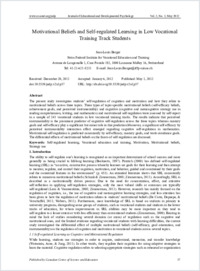Motivational Beliefs and Self-regulated Learning in Low Vocational Training Track Students
PSPE
- Berger, Jean-Louis ORCID Université de Fribourg / Swiss Federal Institute for Vocational Education and Training Avenue de Longemalle 1, Case Postale 192, 1000 Lausanne Malley 16, Switzerland
- 2012
Published in:
- Journal of Educational and Developmental Psychology. - Canadian Center of Science and Education. - 2012, vol. 2, no. 1, p. 37-48
Self-regulated learning
Vocational education and training
Motivation
Motivational beliefs
Strategy use
English
The present study investigates students’ self-regulation of cognition and motivation and how they relate to motivational beliefs across three topics. Three types of topic-specific motivational beliefs (self-efficacy beliefs, achievement goals, and perceived instrumentality) and cognitive (cognitive and metacognitive strategy use in reading comprehension, writing, and mathematics) and motivational self-regulation were assessed by self-report in a sample of 243 vocational students in low vocational training tracks. The results indicate that perceived instrumentality is the prominent predictor of cognitive self-regulation across the three topics whereas mastery goals and self-efficacy play a significant but minor role in that prediction. Moreover, a significant self-efficacy by perceived instrumentality interaction effect emerged regarding cognitive self-regulation in mathematics. Motivational self-regulation is predicted consistently by self-efficacy, mastery goals, and work-avoidance goals. The differential effects of motivational beliefs on the facets of self-regulation are discussed.
- Faculty
- Faculté des lettres et des sciences humaines
- Department
- Département des sciences de l'éducation et de la formation
- Language
-
- English
- Classification
- Psychology
- License
- Open access status
- gold
- Identifiers
-
- DOI 10.5539/jedp.v2n1p37
- ISSN 1927-0534
- Persistent URL
- https://folia.unifr.ch/unifr/documents/321151
Statistics
Document views: 126
File downloads:
- berger2012jedp: 280
